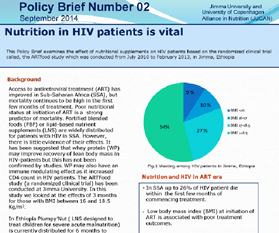Vitamin D, renal function and hypophosphatemia in HIV positive patients in Ethiopia
Principal investigator: Daniel Yilma1
Co-investigators: Pernille Kæstel2, Mette F Olsen2, Alemseged Abdissa1, Markos Tesfaye1, Tsinuel Girma1, Henrik Krarup3, Christian Mølgaard2, Kim F Michaelsen2, Cristian Ritz2, Ole Kirk7, Åse B Andersen4, Henrik Friis4
Collaborating institutions: 1) Jimma University, Ethiopia 2) University of Copenhagen, Denmark 3) Aalborg University Hospital, Denmark 4) Rigshospitalet, Denmark

Background, objective and methods: Human Immunodeficiency Virus (HIV) disease is cha-racterized by a progressive deterioration in immune function. Interventions that offset this im-pairment have the potential to slow HIV disease progression and improve quality of life. Antire-troviral treatment (ART) has allowed dramatic improvement in HIV patients’ outcome. However, side effects of prolonged treatment are numerous and regular follow up with organ function tests is mandatory. Some metabolic abnormalities appear under recognized in HIV infected patients. A prospective observational cohort study; a sub-study to randomized, single-blind, nutritional supplement trial was conducted in Jimma University Specialized Hospital to assess renal function , serum phosphate and vitamin D level on HIV specific treatment outco-me in HIV infected patients initiating ART. Vitamin D paper has been published and data on renal function and hypophosphatemia is being analyzed.
Funding source: US Dairy Export Council and Ministry of Foreign Affairs of Denmark (DANIDA)
Study period: July 2010 to August 2013
Metabolic syndrome, insulin function and cardiovascular disorders in HIV patients: Impact of nutritional supplementation.
Principal investigator: Hiwot Amare Hailemariam1
Co-investigators: Henrik Friis1, Daniel Faurholt-Jepsens2, Alemseged Abdissa3, Mette F Olsen1, Daniel Yilma3, Aase B Andersen2
Collaborating institutions: 1) University of Copenhagen, 2) Rigshospitalet, Denmark 3) Jimma University, Ethiopia
Background, objective and methods: Sub-Saharan Africa is facing a double burden of infectious and chronic diseases. Although availability of ART is increasing life expectancy of HIV patients, poor nutritional status is common and is associated with poor prognosis. In 2012 -2013, the ARTfood study had shown lipid based nutritional supplementation for three months at ART initi-ation improved patients’ weight, lean body mass, muscle strength and suggested an effect on their immune recovery. However, the long-term effects and risk of metabolic complications among HIV patients receiving energy-dense supplements are not known. This will be a follow up study on the ARTfood cohort assessing the predictors of metabolic syndrome, insulin function and cardiovascular disease among Ethiopian HIV patients after five years on ART and the possib-le impact of lipid based supplements on these parameters.
Funding source: US Dairy Export Council, International Atomic Energy Agency (IAEA), and Mini-stry of Foreign Affairs of Denmark (DANIDA) and Nutriset developed the lipid based supple-ments.
Study period: December 2015 to December 2018.
Future perspectives: Funding will be sought follow up this well characterized cohort of HIV pati-ents for other complications of non- communicable disease.

